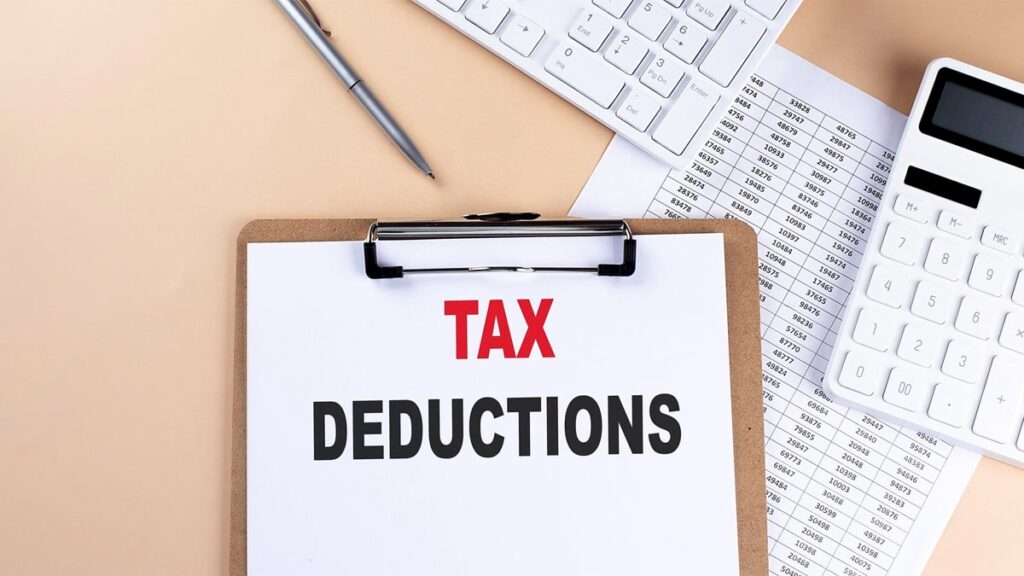A tax deduction is a valuable financial tool that allows individuals and businesses to reduce their taxable liability.
By taking advantage of various tax deductions, taxpayers can legally minimize the amount of money they owe to the government.
Understanding the concept of tax deductions, and their associated benefits is crucial for maximizing savings and optimizing financial planning.
Tax deductions function as incentives provided by governments to encourage certain behaviors or investments that promote economic growth, social welfare, or other policy objectives of the Government.
They serve as a means for taxpayers to lower their taxable income, which is the amount of income subject to taxation. By reducing taxable income, individuals and businesses can potentially move into lower tax brackets and pay a lower percentage of their income in taxes.
Common types of tax deductions include those related to business expenses, charitable contributions, education expenses, medical expenses, and home mortgage interest payments.
Each type of deduction has its own eligibility criteria and limitations, so understanding the rules associated with each deduction is essential to ensure compliance and maximize savings. In this article, we will discuss Tax Deduction- Definition, Types, Benefits, and much more.

Table of Contents
Tax Deduction VS Tax Exemption: What’s the Difference?
Tax deductions and tax exemptions are two terms often used in the context of taxation, and while they share similarities, they refer to different mechanisms for reducing one’s tax liability.
Understanding the distinction between tax deductions and tax exemptions is essential for accurate tax planning and optimizing tax savings, which is as follows:
Tax Deductions:
A tax deduction is a specific expense, cost, or investment that the government allows individuals or businesses to subtract from their taxable income.
By deducting eligible expenses from their income, taxpayers can reduce the amount of income that is subject to taxation.
Tax deductions are typically aimed at encouraging certain behaviors or providing relief for specific costs.
To benefit from a tax deduction, taxpayers must meet specific eligibility criteria and provide proper documentation or evidence of the expense.
Common examples of tax deductions include business expenses, such as office supplies or travel costs, education expenses, charitable contributions, and medical expenses that exceed a certain threshold.
Tax Exemptions:
Tax exemptions refer to certain types of income or entities that are entirely excluded from taxation. In other words, income or entities that qualify for a tax exemption are not subject to taxation at all, regardless of the individual’s or entity’s overall income.
Tax exemptions are often granted to promote specific social, economic, or policy objectives. Tax exemptions can apply to various entities, such as non-profit organizations, religious institutions, or government bodies.
Benefits of Tax Deduction
The following are the benefits of the Tax deduction that the tax payer may get claiming for the tax deduction-
- The primary benefit of tax deductions is that they help reduce the amount of income subject to taxation. By deducting eligible expenses from their taxable income, taxpayers can potentially move into lower tax brackets, which results in paying a lower percentage of their income in taxes.
- Tax deductions can significantly increase savings by reducing the amount of taxes on the individual
- Many tax deductions are designed to incentivize certain behaviours that are considered socially beneficial or contribute to economic growth of the country as well as the tax payer
- Tax deductions can also play a role in stimulating economic growth. By allowing businesses to deduct certain expenses, such as research and development costs or capital expenditures, governments incentivize investments in innovation and expansion.
- Certain tax deductions are specifically aimed at providing relief to individuals or businesses facing financial burdens
- Homeowners often benefit from tax deductions related to mortgage interest payments and property taxes. These deductions help reduce the overall cost of homeownership, making it more affordable and incentivizing investment in real estate.
Types of Tax Deduction
Here are some of the types of tax deduction which is offered to the tax payer-
Public Provident Fund (PPF)
Contributions made to a PPF account are eligible for tax deductions under Section 80C of the Income Tax Act. The interest earned and the final maturity amount are also tax-exempt.
Life Insurance Premiums
Premiums paid for life insurance policies, including term insurance and endowment plans, are eligible for tax deductions under Section 80C.
National Saving Certificate (NSC)
Investments made in National Saving Certificate NSCs are eligible for tax deductions under Section 80C. The interest earned is taxable but reinvested interest qualifies for a tax deduction.
Bank Fixed Deposits (FDs)
Investments made in fixed deposits with banks for a minimum tenure of five years are eligible for tax deductions under Section 80C.
Senior Citizen Savings Scheme (SCSS)
Investments made in the SCSS by senior citizens are eligible for tax deductions under Section 80C. The interest earned is taxable.
Post Office Time Deposit (POTD)
Investments made in POTDs are eligible for tax deductions under Section 80C. The interest earned is taxable.
Unit-linked Insurance Plans (ULIP)
Premiums paid for ULIPs are eligible for tax deductions under Section 80C. The maturity proceeds are also tax-exempt.
Home Loan EMIs
Repayment of home loan principal qualifies for tax deductions under Section 80C, while interest paid is eligible for deductions under Section 24(b) up to a specified limit.
Mutual Funds & ELSS
Investments made in certain mutual funds, specifically Equity Linked Saving Schemes (ELSS), are eligible for tax deductions under Section 80C.
Stamp Duty and Registration Charges for a Home
Expenses incurred for stamp duty and registration charges while purchasing a home are eligible for tax deductions under Section 80C.
Retirement Savings Plan
Contributions made to designated retirement savings plans, such as the National Pension Scheme (NPS) or Employee Provident Fund (EPF), are eligible for tax deductions under Section 80C.
Tuition Fees
Payments made towards tuition fees for children’s education are eligible for tax deductions under Section 80C.
Infrastructure Bonds
Investments made in specified infrastructure bonds are eligible for tax deductions under Section 80CCF.
Charitable Contributions
Donations made to eligible charitable institutions or funds qualify for tax deductions under Section 80G.
Treatment of Disabled Dependents
Taxpayers supporting disabled dependents can claim deductions under Section 80DD or 80U, depending on the circumstances.
Deduction for Preventive Health Check-ups
Expenses incurred on preventive health check-ups for self, spouse, children, or parents are eligible for tax deductions under Section 80D.
Interest Paid on Education Loan
Child of the tax payer can claim education loan tax deduction if they have an active education loan. The Interest paid on loans taken for higher education is eligible for tax deductions under Section 80E.
Deduction on House Rent Paid
Individuals who do not receive house rent allowance (HRA) from their employer but pay rent for their accommodation can claim tax deductions under Section 80GG.
I’m Shiv Kumar, a graduate with a passion for finance, marketing, and technology. My journey into finance started with a desire to understand money management and investing.
Our main goal is to empower individuals through financial education. We believe that everyone should have the opportunity to build a strong financial foundation. Whether you’re a seasoned investor or just getting started, we provide articles, guides, and resources to help you navigate the financial landscape.
I invite you to join our community of financially savvy individuals. Feel free to ask questions, engage with our content, and explore the topics that matter to you. Together, let’s take control of our financial futures.




